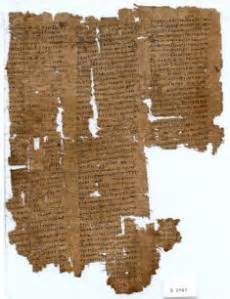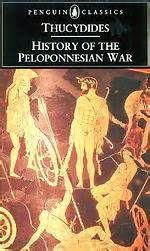Thucydides: Famed Greek Historian
Thucydides is one of the most well-known names from ancient history, entirely because of his famous work History of the Peloponnesian War. He is considered one of the first historians, and some have termed him the father of "scientific history," based on his preference for practice of reporting facts and figures based on eyewitness accounts. Not much is known of Thucydides' life outside of the events he wrote about in History. From that, however, we know that he was born in Alimos in the 5th Century B.C. and that his father, Oloros, was connected with royalty in the area of Thrace. Some sources say that the family was rich, even to the extent of owning gold mines. Thucydides was in Athens in the early part of the war and survived the deadly plague that killed large numbers of Athenians, including the leader, Pericles. The History contains particularly graphic descriptions of plague victims.
The work that has come down to us is in eight books, which tell the story of the war from its beginnings to 411 B.C. The war ended in 404, but Thucydides' narrative ends seven years before. Many historians think that he died in 411. Some sources report that he was allowed to return to Athens and lived into the early 4th century. That does not, however, explain why the History ends abruptly in the middle of 411.
“Think, too, of the great part that is played by the unpredictable in war: think of it now, before you are actually comitted to war. The longer a war lasts, the more things tend to depend on accidents. Neither you nor we can see into them: we have to abide their outcome in the dark. And when people are entering upon a war they do things the wrong way round. Action comes first, and it is only when they have already suffered that they begin to think.” Thucydides went to great pains to report what he himself saw or what other people told him they saw. The one major departure from this was the speeches he included, most notably the famed Funeral Oration of Pericles. Thucydides himself admitted that he wrote these speeches in his own words. He would have been present at very few of those occasions, and very few people were in the habit of writing down things of that nature. He reported that he attempted to capture the essence of what was said. Many later historians agree that he did just that, even if he admitted that he did not transcribe the speeches word-for-word.
He did not report much on what else was happening in Greece during the two decades of the Peloponnesian War. Even though the city-states were continually at war, people found time to go about their daily lives, making things for pleasure and profit, writing poems and plays in addition to ledgers and reports. But Thucydides gave his readers only the war. One exception to this is his descriptions of the differing character of the Athenians and the Spartans. Thucydides goes out of his way to describe the people of Athens as proactive, innovative, revolutionary, demanding, and (in some cases) tyrannical and the people of Sparta as cautious, self-confident, and dedicated to hierarchy. The History remained forgotten during the Middle Ages because interest in reading Greek declined markedly. The first translation, into Latin, occurred in the 15th Century. The English political philosopher Thomas Hobbes created the first English translation in 1628. The name and work of Thucydides has been revered ever since. |
|
Social Studies for Kids
copyright 2002–2024
David White



 In 424, Thucydides was elected strategos (general) and sent to command a group of Athenians at Amphipolis. By the time he got there, however, the city was already under Spartan control. Amphipolis was Athens' main power base in Thrace, and the Athenians considered its loss a major blow to their war efforts against Sparta and its allies. Rulers in Athens blamed Thucydides for not keeping hold of Amphipolis and sent him into exile. He was thus free to conduct the interviews of the major players for which his History is so well-known.
In 424, Thucydides was elected strategos (general) and sent to command a group of Athenians at Amphipolis. By the time he got there, however, the city was already under Spartan control. Amphipolis was Athens' main power base in Thrace, and the Athenians considered its loss a major blow to their war efforts against Sparta and its allies. Rulers in Athens blamed Thucydides for not keeping hold of Amphipolis and sent him into exile. He was thus free to conduct the interviews of the major players for which his History is so well-known. At any rate, the work is filled with dense historical details and methodical narratives of the battle strategies and sites. He also put together, through his interviews of soldiers, sailors, and other eyewitnesses, as well as other written sources, a series of observations that many historians consider apt:
At any rate, the work is filled with dense historical details and methodical narratives of the battle strategies and sites. He also put together, through his interviews of soldiers, sailors, and other eyewitnesses, as well as other written sources, a series of observations that many historians consider apt: Thucydides focused only on the war, on the epic struggle between the dominant naval power (Athens) and the dominant land power (Sparta) and how they coaxed, cajoled, intimidated, and threatened their allies into an ongoing alliance against the common enemy. He included detailed descriptions of siege warfare, of heavily armed troops struggling for hours on end with no sign of battle's end, of a naval force attempting to break through a land forced arrayed at water's edge to repulse that landing, of an epic night battle (at Syracuse).
Thucydides focused only on the war, on the epic struggle between the dominant naval power (Athens) and the dominant land power (Sparta) and how they coaxed, cajoled, intimidated, and threatened their allies into an ongoing alliance against the common enemy. He included detailed descriptions of siege warfare, of heavily armed troops struggling for hours on end with no sign of battle's end, of a naval force attempting to break through a land forced arrayed at water's edge to repulse that landing, of an epic night battle (at Syracuse).
